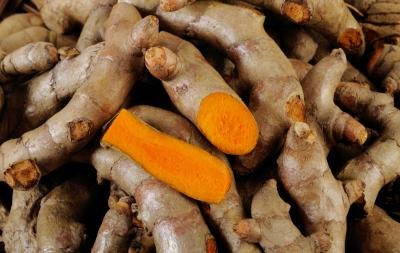
Overview
Turmeric has long been used for its digestive, anti-inflammatory and antioxidant benefits. The primary compounds to which turmeric's benefits are attributed are curcuminoids and volatile oils, explains the Memorial Sloan-Kettering Cancer Center. While raw turmeric has many purported benefits, it's important to note, as the National Center for Complementary and Alternative Medicine does, that research is ongoing, and little current scientific evidence to support them.
Digestive Tract Benefits

The curcumin content of turmeric triggers bile production, which is believed to help the digestive system, explains the University of Maryland Medical Center, or UMMC. Turmeric may ease the symptoms of indigestion and alleviate heartburn. The National Institutes of Health, or NIH, adds that turmeric may provide relief from symptoms of irritable bowel syndrome as well, and UMMC states it may boost the remission of ulcerative colitis, a form of inflammatory bowel disease. Turmeric may help treat stomach ulcers too, according to NIH, which also cautions that high doses can be counterproductive, further irritating the stomach.
Anti-Inflammatory Benefits

Anti-inflammatory agents in turmeric may be useful in relieving symptoms associated with rheumatic conditions, according to NIH. Turmeric is sometimes used as part of the course of treatment for osteoarthritis and rheumatoid arthritis. It may help with the pain and loss of mobility from these conditions. Turmeric may also be useful for treating uveitis, a form of eye inflammation, states UMMC.
Preventing Heart Problems and Stroke

Turmeric may help prevent heart disease, heart attack and stroke with its effects on some key risk factors of these three conditions. It may help stop atherosclerosis, the buildup of arterial plaque, according to UMMC, and it may help prevent blood clots, according to NIH. Additionally, NIH cites the lowering of LDL, or "bad" cholesterol levels, as a possible benefit of turmeric.
Cancer Protection

Turmeric may help prevent, manage and treat various forms of cancer, including skin, breast, prostate and colon cancer, according to UMMC. However, it points out that evidence has only been found in test tube and animal studies so far. The antioxidant properties of turmeric are believed to be at least partially responsible for its anti-cancer activities.
Other Benefits

Turmeric may help regulate blood sugar levels in patients with diabetes, according to UMMC. Its ability to boost bile flow may also be useful in gallstone prevention, says NIH, which adds other possible benefits. These include liver protection and help in the treatment of HIV, scabies and viral infections.
www.livestrong.com





No comments:
Post a Comment